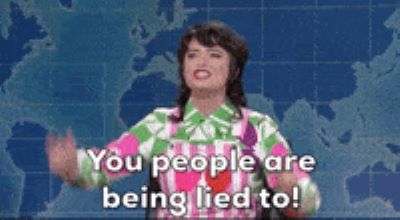Bradenton, FL Guys, what even is politics? I’m genuinely asking. I mean, nowadays everywhere you look there’s some political candidate running a smear campaign against their opponent. Trying so hard to prove to you just how much of a monster the other guy is in comparison to them.
The thing is you don’t even know what you like about the candidate who “approves this message” before you know all about their opponent’s ex-girlfriend’s dog’s cousin’s sister that endorsed the KKK twenty years ago. Now, I can’t put my finger on it, but something sounds wrong with that statement.
These campaign strategies subscribe to the wise words of Lin Manuel Miranda in his hit musical, Hamilton, “they don’t need to know me, they don’t like you.” But isn’t that… I don’t know, shady? Candidates push these ads because they want to appeal to a larger audience, otherwise known as both the Republican and Democratic parties. By showing their audience that they’re the lesser of the evils, they’ve convinced more people that they’re the best choice for the job.
But when you pull back the mask that these politicians have placed on their faces, you’ll notice the much more sinister expression they wear. When you drill down into the core of the issue you find that it isn’t about “who’s better for the job,” or political presence; it’s about power. Now, what people do with that power is different, and maybe the candidate you or your parents elect this fall will make a positive change. But it doesn’t dissuade the fact that power leads to profit, whatever the intended outcome may be.
So how are these people still getting elected? If all they’re doing is giving us small assurances here and there, playing the victim while they make their millions, how are these people being chosen to lead America? In a word, belief.
Because these smear campaigns, large allegations and tall tales mean nothing if no one believes them. So, they make you believe them. Politicians will find your weaknesses and exploit them, whether it’s a tug on your heart strings, or a video with factual, cold-hard logic, they always seem to find a way. The American public has a right to know that they’re exploitable, just as much as they have a right to know when they’re actively being exploited.
These acts of political gain are something that you’ve probably heard of before from your middle school civics class: propaganda. The publicization of a biased point of view.
It’s time to put our thinking caps on and question the reputability of the politicians we put in charge. After all, what was it about the boy who cried wolf?
Running the Gambit
So, there’s seven main types of propaganda that politicians use on the regular that I’ve dubbed the “seven evil exes of an honest society” … you know, like Scott Pilgrim? It doesn’t matter, the point is, propaganda is often based in truth and is exaggerated to sway your opinion. You’ve probably heard the saying that a lie is more effective if it contains some form of truth.
Which… yeah. I’m more inclined to believe someone using evidentiary support to back up their claim than someone in a tin foil hat shouting at me across the street that the moon is made of cheese because it’s in the Milky Way galaxy.
Politicians can tell white lies and/or withhold bits of information from you by presenting it in different ways. Read: I hate caviar, but if you tell me it’s salty boba I might just consider it.
So how can they present it? In seven special ways of course! The propaganda techniques are as follows: name-calling, card-stacking, transfer, bandwagon, testimonial, glittering generalities, and plain-folks.
Let’s break down what each of them means, shall we?
Name-calling is exactly what it sounds like. This technique is particularly dicey and mean-spirited. These ads will be your typical smear campaigns, calling the opponent unworthy, stupid, or unamerican. Or in the case of Alec Lace, guest on Fox Business Network, Kamala Harris was “the original Hawk Tuah girl.” Sure Alex, I’ll take the grossest statement I’ve ever heard on a news broadcast for a thousand.
Card-stacking can be a couple of different things. Its most common use is simply withholding information about the opponent; telling you a fact, but not the whole fact. The other term you might’ve heard for this is cherry-picking. Pick out the statements that help your case and disregard the ones that don’t.
The more sinister side of it includes data corruption. For example, if you’re sending a poll around school asking students to pick between red and yellow, but you only send it to people who hate red, your data isn’t showing the full story. That’s why scientists pick a pool of different people to ensure that their statistics are the most accurate.
Transfer is what you’ve heard your therapist say your ex did… project. The person “transfers” negative or positive qualities onto something or someone to either discredit or accredit that person or thing. A great example of this would be those cigarette advertisements from the 40s and 50s. One particularly prominent phrase of endorsement was “Don’t deny yourself the luxury of Camels.” The statement paints Camels cigarettes as luxurious, which aided the tobacco industry by giving people reason to believe that cigarettes were a status symbol. Because, you know, when you think luxury, you think lung cancer!
Next up, we’ve got the bandwagon. These are going to be your rallies for support, the “everyone’s doing it, mom.” Politicians have used this one a lot in the past, their conventions and rallies often promoting it. However, my personal favorite example of this strategy was for Eisenhower’s election year, with his ad, “I Like Ike.”
“I Like Ike” is an ad from 1952, written in the form of a song for Eisenhower’s campaign. Fair warning, it’s an earworm. After repeating the phrase “Ike for president” four times, the song starts out with the lyrics, “I like Ike, you like Ike, everybody likes Ike,” while a cartoon elephant trots down a road that donkeys are fenced off from. Really on the nose, I know, but it’s also the textbook definition of a bandwagon argument.
Now, a crazy example of a testimonial would be like if Kamala Harris invited Lil Jon to perform “Turn Down for What” while repeatedly endorsing her on behalf of the state of Georgia… wait. https://youtu.be/_Uvxl0mCaYY?si=Q3TtX92-zb4jWQYE
Yeah, that actually happened at the DNC this year during the roll call for the states. A testimonial is essentially someone who has sway over the public in any way endorsing someone or something. For example, Pepsi uses testimonials often enough that when I looked up “testimonial propaganda examples,” it was the first thing to pop up. No hate obviously, caffeine is caffeine.
Coming second to last in this long and tedious list of mine, we have glittering generalities. You know the phrase, “all that glitters is not gold?” That’s what you have to remember when you see things with this technique. Glittering generalities is what we call it when you tell people a blanket statement that’s oh, so, positive on paper, and essentially means nothing.
For example, one could say “both presidential candidates want what’s best for America.” Sure… but what does that mean? It’s important to note that you can’t build a campaign off this; it’s unsustainable. But sometimes, all people need is a subtle reassurance. Both candidates want drastically different things for the future of America, yes… but isn’t it awfully nice to hear that they only want what’s best for you?
Finally, I give you the last type of propaganda to cover before my hand actually falls off from typing so much: plain-folks. Plain-folks is just saying that whatever is being endorsed is “one of you.” Not creepy at all, I know. This strategy is often coupled with a bandwagon saying “The people feel this way about XYZ, and I’m telling you this because I’m one of them.” It makes people sound relatable, less politically motivated and more personable. Ah yes, no longer is it former POTUS, Donald Trump standing at a podium begging you to vote for him, but Donald Trump, American citizen, and family man… still begging you to vote for him.
So, there you have it: the seven evil exes of an honest society. But if they’re evil why do politicians use them?
Now, Place Your Bets as to Who that Benefits…
Historically speaking, propaganda is used to drive a point home. Everything circles back to that overarching theme of belief we talked about earlier.
Take those old World War I posters for example. You know, the ones with Uncle Sam pointing to the viewer and saying “I want you”? Chances are you’ve encountered these somewhere in your nine to twelve years of education.
All you need to know is that the United States needed people to enlist in the military to win a war against the Central Powers, and people didn’t think leaving their families to potentially go die was a good use of their time.
Which… yeah. I wouldn’t think so either.
But we were desperate, and desperate times call for desperate measures. Sure, the average Joe wouldn’t want to give their life for their country, but what if joining the military is what made you special? What if it not only made you special but made you a hero?
Well, that was the pitch; join the military and be a hero. A large number of enlistments after these posters were plastered everywhere were from people who believed in that side of the military. Unfortunately, for those of you who don’t know, the military isn’t a sanctuary where everyone holds hands and talks about rainbows.
The people who enlisted didn’t sign up for the organization that they got, they signed up for the one they were presented; one that would ensure drinking, cheering, and women would be a prevalent part of the process.
But the posters worked, right? People enlisted… in herds or flocks or whatever you want to call it. So, why do politicians use propaganda?
Because it works.
It’s persuasive, and effective, and… a little underhanded but hey, that’s politics. The point is it makes people believe in your cause.
So, we know the “how” and the “why”, but I think there’s a more difficult question we need to address: is propaganda ethically okay?
Most of me wants to say that it’s not; that you shouldn’t lie to people to make them believe you; that propaganda is just large scale lying; that it preys on activism and optimism, while providing you with just the right amount of pessimism to make it relatable.
But there’s also a part of me that recognizes its necessity. Something that I’ve come to understand about politics is that most representatives believe that the ends justify the means… and I think that’s fair in some cases.
I wonder if we would’ve won the war without those posters that caused so many people to enlist. These people lost their lives for a country that they would never see again, and they saved it. They truly were heroes.
But they never got to reap the benefits of heroism. The point is, the posters didn’t outright lie, but they didn’t tell the full truth.
Remember, a lie is more believable if some part of it is true.
I happen to like being able to walk to school, where I get a good education, and can talk freely about whatever I want to my friends. I wouldn’t have that if we didn’t win, and by extension, if propaganda hadn’t done its job.
Therefore, I think that propaganda is ethically alright. However, that doesn’t mean you have to believe it or can’t recognize when you’re being lied to. I think that people should be able to tell the difference between a flat out lie, and white lie for the sake of the nation.
The Only Game in Town
So, we’re at the end of this extremely long article that started as an explanation of what propaganda is and is now questioning the morality of lying as a whole… how did we get here again?
In short, these political advertisements are built into the system as we know it. You have to have an argument to build a campaign, and one of the easiest ways to construct one is through propaganda; something easily digestible, but fictional enough that it grabs your attention.
Not all of these ads are bad or immoral, but it’s important to fact check everything you read. Hell, you should fact check me.
You deserve to know what’s real and what’d fake.
You also deserve to believe in a cause. After all, how else would we get anything done? Change starts as an idea first and foremost, who’s to say that idea can’t come from you?
If you’re reading this, you are an individual with your own set of morals and boundaries, and a brain that tops it all off. From the dawn of mankind, people have been survivors. To be a survivor is to be smart, something I believe people intrinsically are. Your brain comes up with these unique, interesting, terrible, incredible ideas.
Don’t let go of them just because someone told you to.




